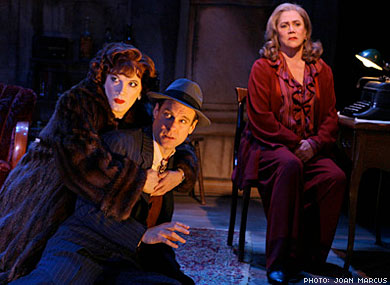As Peg, the boozy, washed-up screenwriter (Kathleen Turner) in Charles Busch‘s play The Third Story explains,
I told you the third story is often the best. The first is the genesis of an idea, but usually completely off the track. The second is when you go overboard with flights of imagination. The third story is when you return to the truth.
Well, you would think that La Cieca, being so boozy and washed-up herself, would keep so important a truth inscribed on a plaque or something so she’d never, never forget that, in the case of really major stories, it’s the third that finally centers in on reality.
That particular bit of wisdom has been brought home to La Cieca now that she has heard (from one of her usually reliable sources) a third and (who knows) perhaps even a truthful version of why that dramatic soprano left that opera company.Â
The first story, as you recall, had to do with a joint injury. This, you recall, was the “official” reason given.
The second story, as La Cieca whispered, suggested a failure of memory or lack of application. (La Cieca leaned toward the former: let’s call that one “2-A.”) La Cieca now understands that this was the buzz backstage at the time of the event.
Now comes story number three, and it sounds just complicated enough to be true. In a nutshell, the director of this production (who, you will recall, has not been hands-on with his “masterpiece” for many years) has reportedly been acting like “an unremitting cunt” during rehearsals.
Like many a martinet before him, the director chose one particular member of the company to be his main whipping boy (or, in this case, whipping girl) and that particular member happened to be this soprano. La Cieca hears he criticized her appearance, called her ungainly, complained about her diction, and, in general, conveyed that she had no business in “his” production.
A detail of the account as related to La Cieca that conveys the ring of truth is that the soprano in question got no help or support in this difficult time from the conductor of the production — a maestro whose “bring me no bad news” attitude is notorious.
Facing the prospect of so high-profile and demanding a role debut under such unfavorable (not to say miserable) circumstances, our soprano walked.
Which, La Cieca will point out, you can’t do if your knee’s not working.



